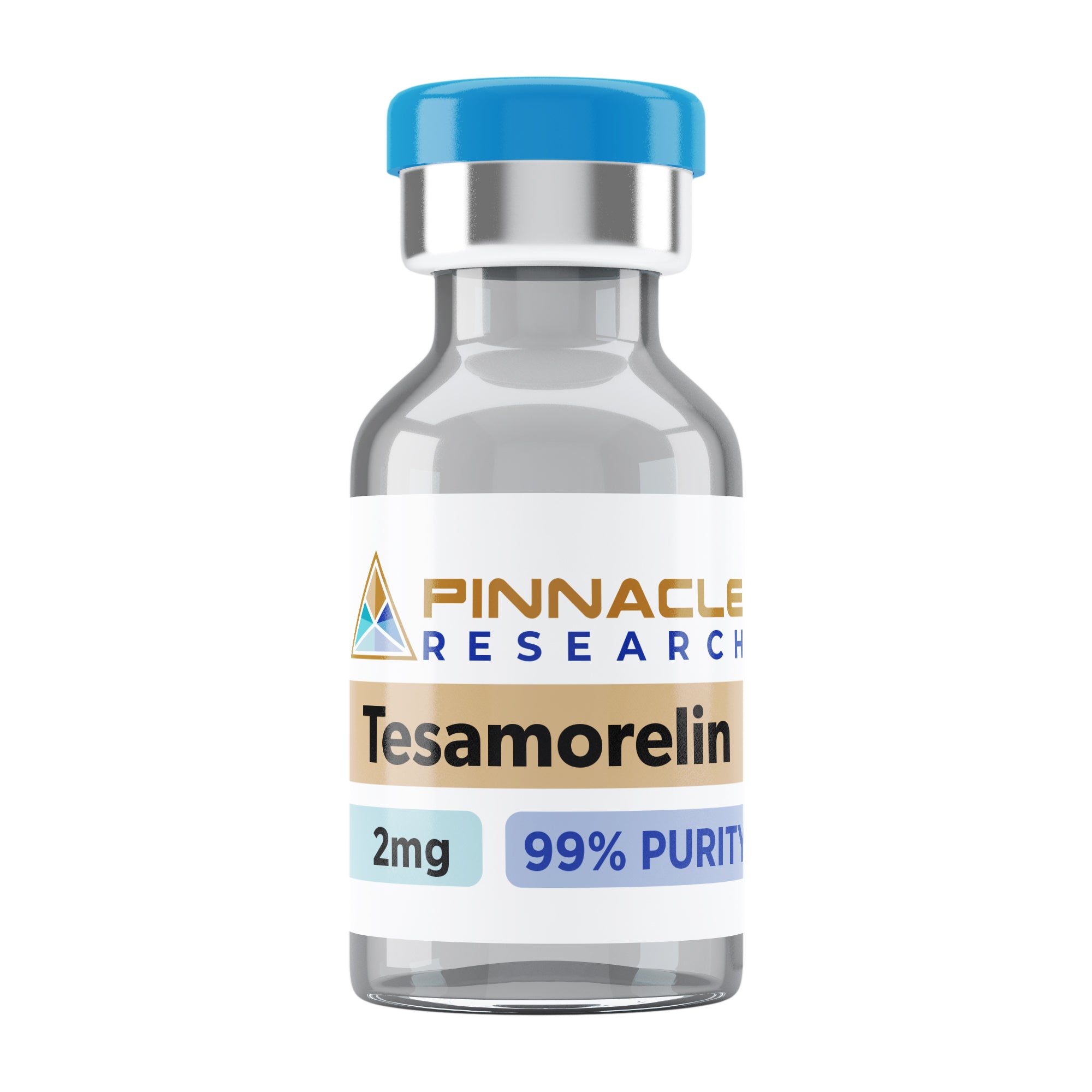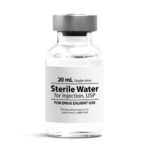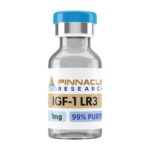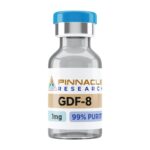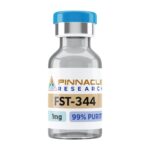Description
THIS PRODUCT IS INTENDED AS A RESEARCH CHEMICAL ONLY. This designation allows the use of research chemicals strictly for in vitro testing and laboratory experimentation only. All product information available on this website is for educational purposes only. Bodily introduction of any kind into humans or animals is strictly forbidden by law. This product should on be handled by licensed, qualified professionals.
| Physical Appearance |
Fine White Lyophilized Powder |
| Residue Sequence |
Unk-Tyr-Ala-Asp-Ala-Ile-Phe-Thr-Asn-Ser-Tyr-Arg-Lys-Val-Leu-Gly-Gln-Leu-Ser-Ala-Arg-Lys-Leu-Leu-Gln-Asp-Ile-Met-Ser-Arg-Gln-Gln-Gly-Glu-Ser-Asn-Gln-Glu-Arg-Gly-Ala-Arg-Ala-Arg-Leu-NH2.CH3CO2H |
| Solubility |
100 ug/mL sterile diluent (distilled de-ionized water) |
| Source |
|
| Purity |
>99% |
| Stability |
Lyophilized protein is to be stored at -20°C. It is recommended to aliquot the reconstituted (dissolved) protein into several discrete vials in order to avoid repeated freezing and thawing. Reconstituted protein can be stored at 4°C. |
About Tesamorelin
Tesamorelin is an analogue of the naturally occurring growth-hormone-releasing hormone (GHRH), primarily used in treating HIV-associated lipodystrophy. When the body suffers from lipodystrophy, there is excessive fat accumulation in the body, especially around the abdomen. Scientists are investigating the compound to determine its potential use in reducing fat mass, improving peripheral nerve health and slowing the progression of dementia and mild cognitive impairment.
What Is Tesamorelin?
The Tesamorelin compound is a synthetic analogue of the naturally occurring growth-hormone-releasing hormone (GHRH). Apart from having the standard GHRH, it has an extra trans-3-hexanoic acid group. Theratechnologies, a Canadian company, manufactures the artificial compound. In 2020, the Tesamorelin peptide was the first drug to be approved by FDA to be used in treating HIV-associated lipodystrophy. There are ongoing studies investigating the use of the peptide in improving peripheral nerve regeneration. Scientists also believe the peptide can be instrumental in preventing mild cognitive impairment (MCI), a precursor of dementia.
Being a GHRH analogue, the Tesamorelin compound has the same benefits as GHRH and the other GHRH analogues like GRF (1-29), CJC-1295, sermorelin, etc. The only key difference present in Tesamorelin is the trans-3-hexanoic acid, which gives the peptide more stability in the bloodstream and a longer half-life. Even though the compound has an increased half-life like CJC-1295, it retains the GHRH’s physiological action. It also has fewer side effects than similar peptides, obliterating regular pulsatile growth hormone release.
Tesamorelin Chemical Structure
- Sequence (Single Letter): Unk-Tyr-Ala-Asp-Ala-Ile-Phe-Thr-Asn-Ser-Tyr-Arg-Lys-Val-Leu-Gly-Gln-Leu-Ser-Ala-Arg-Lys-Leu-Leu-Gln-Asp-Ile-Met-Ser-Arg-Gln-Gln-Gly-Glu-Ser-Asn-Gln-Glu-Arg-Gly-Ala-Arg-Ala-Arg-Leu
- Molecular Formula: C223H370N72O69S
- Molecular Weight: 5195.908 g/mol
Tesamorelin Research and Effects
Lipodystrophy
Tesamorelin is famously known in the medical field for treating HIV-associated lipodystrophy. The HIV-associated lipodystrophy effect is caused by HIV infection. It is a side effect of the antiretroviral therapy HIV patients undergo to prevent the condition from progressing to AIDS. During lipodystrophy, the body undergoes excessive fat accumulation, especially around the midsection. Scientists have been unable to understand the physiologic mechanism that triggers HIV-associated lipodystrophy fully. There is a scientific theory that protease inhibitors could initiate the pathogenesis of lipodystrophy in HIV patients using antiretroviral therapy.
In the past, patients suffering from HIV-associated lipodystrophy had to implement strict diets, work out frequently, and use various fat-burner medications, which proved ineffective. Most patients with excessive lipodystrophy had no option but to undergo surgical treatment, which was also ineffective, costly and high-risk. FDA approved Tesamorelin in 2010 as a viable treatment option for HIV-associated lipodystrophy. Scientific studies show that the drug can reduce up to 20% of adiposity in HIV patients. Tesamorelin is four times more effective in adiposity reduction than other treatment therapies.
Cardiac Disease
One of the most significant health risks of HIV patients is developing cardiovascular disease (CVD). HIV patients must take their antiretroviral to prevent the progression of HIV into AIDS. However one of the acute side effects of the treatment is lipodystrophy which causes excessive fat accumulation. Abnormal fat deposition is one of the causal factors of developing cardiovascular disease. Preventing cardiovascular disease in HIV-positive patients is a vital medical intervention to ensure the long-term well-being of the patients, especially when combined with highly active antiretroviral therapy (HAART). Doctors used statins as the primary medical management option for HIV-positive patients suffering from lipodystrophy.
Recent studies show that the Tesamorelin peptide has many health benefits for HIV patients. Apart from reducing the offset of HIV-associated lipodystrophy, the compound reduces triglyceride, non-HDL-C and total cholesterol levels in HIV patients. There was a 15% decrease in the visceral adipose tissue when subjects took 50mg of Tesamorelin.
Ectopic fat deposition is experienced during lipodystrophy, and it’s caused by inflammation. Any inflammation can trigger developing cardiovascular disease. Visceral adipose tissue, epicardia, and liver fat are associated with an increased risk of CVD. When Tesamorelin affects ectopic fat deposition, it minimizes the risk of inflammation and developing cardiovascular diseases.
HIV and Growth Hormone Deficiency
According to recent studies, highly active antiretroviral therapy (HAART) has been linked to several endocrine and metabolic complications. One of the main complications is growth hormone (GH) deficiency. When infected with HIV, the pituitary gland is tampered with. Thus more than 1/3 of HIV patients taking the HAART treatment experience GH deficiency. Scientists believe this could explain to some extent why HIV patients suffer from lipodystrophy and why the Tesamorelin peptide is a variable treatment option for dealing with the condition. Tesamorelin offers a more effective and safer way of restoring GH levels instead of taking exogenous GH hormones. The treatment option is most suitable for HIV-positive patients.
Peripheral Nerve Damage
The peripheral nerve can be damaged by injury, diabetes, or surgical interventions. When you suffer from peripheral nerve damage, you experience debilitating problems with your sensory and motor functions, especially in the affected region. Nerve cells are very hard to regenerate; hence there is usually very little medical treatment that can be done in such a scenario. Recent research studies have revealed that hormone manipulation therapies may enhance peripheral nerve injury. The therapies can improve the healing of the peripheral nerve. Tesamorelin is the main peptide being investigated as a viable product for this new hormone manipulation therapy.
Dementia
There is substantial scientific evidence showing GHRH analogues can effectively enhance the cognitive abilities of patients suffering from the early stages of dementia. University of Washington School of Medicine performed a massive, double-blind, and placebo-controlled study, which was randomized. During the twenty weeks, scientists concluded that the tesamorelin peptide and other GHRH analogues could impact dementia. The GHRH analogues decreased the Myo-inositol (MI) levels, thus increasing gamma-aminobutyric acid (GABA) levels in the brain tissues. Findings from the study have opened a new pathway in using the Tesamorelin compound as a preventive and viable treatment option for patients who have dementia.
Tesamorelin is one of the most revolutionary treatment products for HIV patients, helping them deal with HIV-associated lipodystrophy, thus prolonging their life through ARV treatment. It is approved by the FDA and is of critical interest in ongoing clinical studies. Currently, scientists are reviewing its potential to enhance the cardiovascular health of HIV patients. Apart from that, substantial evidence suggests the peptide can be instrumental in improving the healing of damaged peripheral nerves and the prevention of dementia progression. During the various research studies, Tesamorelin exhibited excellent subcutaneous bioavailability, minimal side effects, and low oral when used in mice.
Tesamorelin has revolutionized the treatment therapies of HIV patients, prolonging their life by eliminating HIV-associated lipodystrophy. If you are an HIV-positive patient, you should consider using the Tesamorelin peptide.
